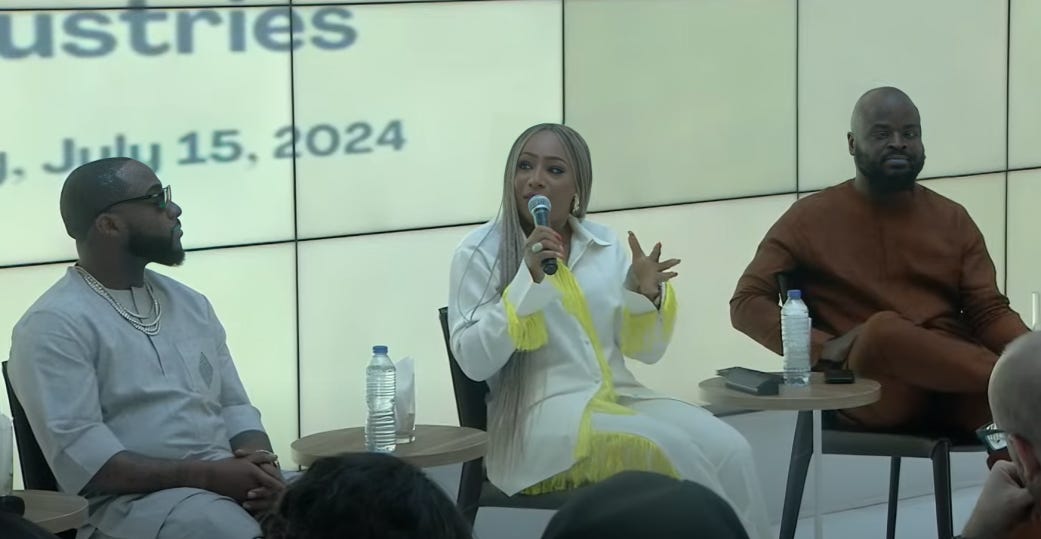American Actors Now Want to be in our Films- Davido
In a remarkable gathering hosted by the President’s Advisory Council on African Diaspora Engagement in the United States (PAC-ADE) in Lagos, the spotlight shone brightly on the potential of Nigeria’s creative industries. The event, aimed at fostering connections between African communities and the diaspora, brought together influential Nigerian celebrities like Davido, Dakore Akande, Zulu Oyibo, and Idris Olorunnibe. Their collective call for robust creative exports, cultural exchanges, and joint productions underscored a transformative vision for the future.
A Two-Way Exchange
Davido, a global ambassador for Afrobeats, eloquently highlighted the reciprocal desire between Nigerian and American actors to cross into each other’s film industries. This mutual interest marks a significant shift in global cultural dynamics. As Davido put it, “American actors now want to be in our films, just as we've always wanted to be in Hollywood.” This isn’t just about individual ambition but about breaking down barriers and creating intentional pathways for collaboration.
The Blueprint for Success
Dakore Akande stressed the need for intentionality in creating opportunities for talent exchange. She envisions a world where Nigerian and American creative professionals can seamlessly work together, learning and growing from each other’s industries. This exchange would transfer invaluable skills and open new avenues for storytelling and production, enriching both cultures.
Zulu Oyibo, from Inkblots Production, pointed to the Korean film industry as a model of what robust government support can achieve. She urged Nigerian authorities to provide similar backing to elevate the country’s film industry to global standards. Her call to “do what you are doing well but upscale” resonated with many, emphasizing the need for excellence to attract international platforms.
Infrastructure and Talent: The Twin Pillars
Idris Olorunnibe, CEO of Temple Company and Ogidi Studios, highlighted two critical deficits: infrastructure and talent. He proposed the creation of a diaspora fund as an intervention to develop the industry’s infrastructure, which would be pivotal in nurturing and retaining talent. His insight into the business side of the creative industries is a reminder that artistic success is often built on solid business foundations.
Overcoming Barriers
The event also addressed the practical challenges Nigerian talents face in accessing international platforms, such as work permits, visa support, and trade agreements. These hurdles can stymie the global ambitions of even the most talented individuals. The discussions underscored the need for streamlined processes and better support systems to facilitate international collaborations.
A Platform for Change
The remarks from US Consul Will Stevens and Executive Director Deniece Laurent-Mantey highlighted the foundational work laid by existing relationships between Nigeria and the United States. They emphasized the importance of building on these relationships to address shared challenges and unleash the potential of the creative industries. Laurent-Mantey’s assertion that “artists have become architects of change” beautifully encapsulates the transformative power of creative collaboration.
The Economic Impact
Arun Venkataraman, the US Assistant Secretary for Commerce for Global Markets, outlined the staggering potential of Nigeria’s creative industries. With the capacity to create millions of jobs and add billions to the GDP, these industries are not just cultural assets but economic powerhouses. His comments on the inclusivity and upward mobility offered by the creative economy highlighted its role in providing equitable opportunities, particularly for young people and women.
A Vision for the Future
The PAC-ADE event in Lagos was more than just a meeting; it was a clarion call for a future where creative industries are at the forefront of cultural and economic exchanges between Africa and the world. The advocacy for creative exports, cultural exchanges, and joint productions is not just about entertainment but about shaping global narratives and fostering mutual understanding. As the discussions at the event made clear, the time to act is now, and the potential rewards are immense.





